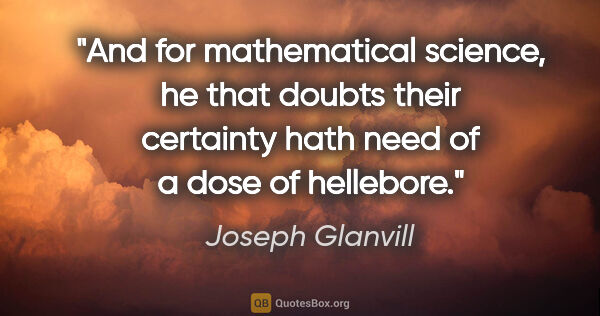Mathematics And Science Quotes
Once, probably, I used to think that vagueness was a loftier kind of poetry, truer to the depths of consciousness, and maybe when I started to read mathematics and science back in the mid-70s I found an unexpected lyricism in the necessarily precise language that scientists tend to use My instinct, my superstition is that the closer I see a thing and the more accurately I describe it, the better my chances of arriving at a certain sensuality of expression.
Don DeLillo
A man may possess a profound knowledge of history and mathematics; he may be an authority in psychology, biology, or astronomy; he may know all the discovered truths pertaining to geology and natural science; but if he has not with this knowledge that nobility of soul which prompts him to deal justly with his fellow men, to practice virtue and holiness in his personal life, he is not truly an educated man. Character is the aim of true education; and science, history, and literature are but...
David O. McKay
These rules, the sign language and grammar of the Game, constitute a kind of highly developed secret language drawing upon several sciences and arts, but especially mathematics and music (and/or musicology), and capable of expressing and establishing interrelationships between the content and conclusions of nearly all scholarly disciplines. The Glass Bead Game is thus a mode of playing with the total contents and values of our culture; it plays with them as, say, in the great age of the arts...
Herman Hesse
The aspirations of democracy are based on the notion of an informed citizenry, capable of making wise decisions. The choices we are asked to make become increasingly complex. They require the longer-term thinking and greater tolerance for ambiguity that science fosters. The new economy is predicated on a continuous pipeline of scientific and technological innovation. It can not exist without workers and consumers who are mathematically and scientifically literate.
Ann Druyan

In the eighteenth century, philosophers considered the whole of human knowledge, including science, to be their field and discussed questions such as: Did the universe have a beginning? However, in the nineteenth and twentieth centuries, science became too technical and mathematical for the philosophers, or anyone else except a few specialists. Philosophers reduced the scope of their inquiries so much that Wittgenstein, the most famous philosopher of this century, said, "The sole remaining...
Stephen Hawking
- 1
- 2